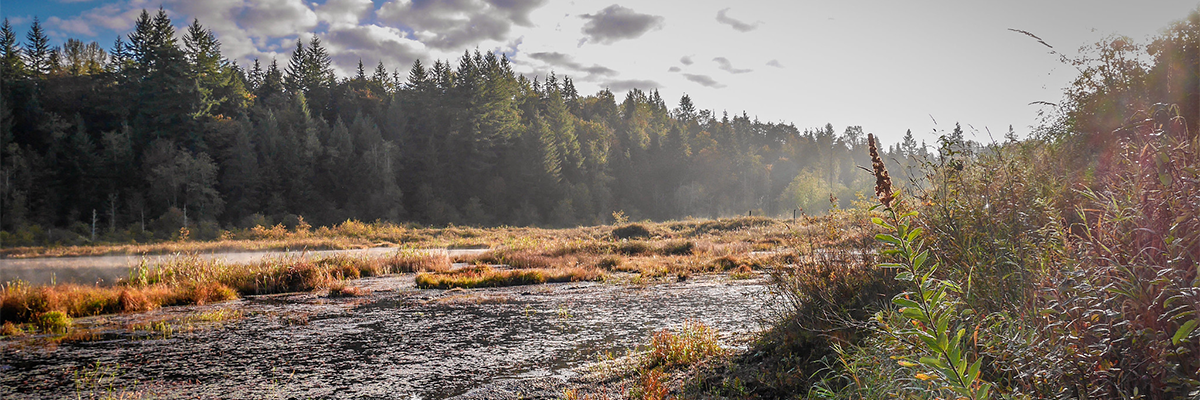Moss Lake

About the Park
Located in the Cascade foothills, Moss Lake Natural Area is 372 acres of high-quality wetland and forested upland habitat with three miles of multi-use trails. The extensive 150-acre wetland includes the 40-acre sphagnum bog surrounding Moss Lake, decades-old beaver dams, and a cattail and spirea-fringed lake.
Sphagnum moss bogs, the most sensitive and rarest habitat type, are unique plant communities composed of up to twenty-five feet of acidic peat deposits that build up over very long periods of time, locally at a rate of one inch per forty years. Being unique, bogs like the one at Moss Lake Natural Area are home to similarly unusual and rare plants and creatures such as the Beller's ground beetles. The Round-leaved Sundew, a common but not abundant carnivorous plant, is occasionally found growing on the moss at Moss Lake.
Moss Lake Natural Area is also an excellent place for bird watching for species such as bald eagle, Vaux’s swift, belted kingfisher, Great Blue Heron, red-tailed hawk, pileated woodpecker, and bandtailed pigeon.
Park activities and facilities
Dog walking
Hiking
Horse riding
Mountain biking
Nature observation
Non-motorized boat ramp
Volunteer
Location
Moss Lake is five miles southeast of Duvall, 3.5 miles northeast of Carnation, and one mile east of Lake Joy in the Cascade foothills.
Nearby Bus Stops
Moss Lake Natural Area is served by Snoqualmie Valley Transportation along Northeast Big Rock Road.
Parking
There is a parking area at the park entrance at the end of Northeast Moss Lake Road.
Trailheads
The main trailhead and a pit toilet is located at the end of Northeast Moss Lake Road.
Park History
Abridged from the 2007 Moss Lake Natural Area Site Management Guidelines: Moss Lake Natural Area has been used for a variety of resource extraction activities extending back to when the Seattle area was settled in the late 1800s. The original forest was likely harvested in the early 1900s and subsequent second-growth harvest has left a patchwork of successional mixed coniferous and deciduous forest on the property.
Peat moss extraction and drying are also known to have occurred here. In the 1920s, a moss drying plant was constructed on the east end of the lake. The plant subsequently burned to the ground and was not replaced. Preparatory work for additional peat excavation occurred from 1953 to 1954. However, the project was abandoned before work began. Anecdotal reports of peat extraction as late as the 1960s have been noted through conversations with long-time residents of the area.
Moss Lake Natural Area became public property in phases, beginning in 1990. In 2001, King County installed a parking area, outhouse, a short boardwalk over part of the wetland adjacent to the parking lot, widened the access road, and installed gates. In 2005, a local Eagle Scout candidate constructed five bat boxes on the site in an effort to provide bat habitat and increase the bat population.
Additional resources
2007 Moss Lake Natural Area Site Management Guidelines
- Figure 1: Moss Lake location map
- Figure 2: Moss Lake aerial photo map
- Figure 3: Moss Lake aerial parcel map
- Figure 4: Moss Lake topographic hillshade map
- Figure 5: Moss Lake soils map
- Figure 6: Moss Lake hydrography map
- Figure 7: Moss Lake survey map
- Figure 8: Moss Lake roads and trails map

 Translate
Translate